

Apò mēkhanḗs theós. 100th Meme Keys. Altered States. Entheogenic Review. Oracula. Gnosis. Etymology[edit] Gnosis is a feminine Greek noun, which means "knowledge".[2] It is often used for personal knowledge compared with intellectual knowledge (eidein), as with the French connaitre compared with savoir, or the German kennen rather than wissen.[3] Related adjective gnostikos[edit] A related term is the adjective gnostikos, "cognitive,"[4] a reasonably common adjective in Classical Greek.[5] Plato uses the plural adjective γνωστικοί – gnostikoi and the singular feminine adjective γνωστικὴ ἐπιστήμη – gnostike episteme in his Politikos where Gnostike episteme was also used to indicate one's aptitude.
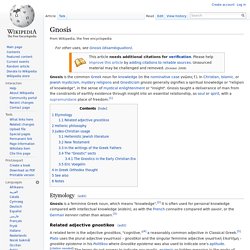
[citation needed] The terms do not appear to indicate any mystic, esoteric or hidden meaning in the works of Plato, but instead expressed a sort of higher intelligence and ability analogous to talent.[6] Nous. This article is about a philosophical term.
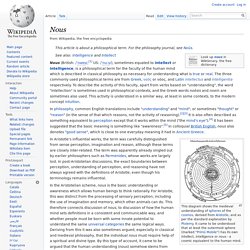
For the philosophy journal, see Noûs. In philosophy, common English translations include "understanding" and "mind"; or sometimes "thought" or "reason" (in the sense of that which reasons, not the activity of reasoning).[2][3] It is also often described as something equivalent to perception except that it works within the mind ("the mind's eye").[4] It has been suggested that the basic meaning is something like "awareness".[5] In colloquial British English, nous also denotes "good sense", which is close to one everyday meaning it had in Ancient Greece.
This diagram shows the medieval understanding of spheres of the cosmos, derived from Aristotle, and as per the standard explanation by Ptolemy. It came to be understood that at least the outermost sphere (marked "Primũ Mobile") has its own intellect, intelligence or nous - a cosmic equivalent to the human mind. Pre-Socratic usage[edit] Tacit knowledge. Tacit knowledge (as opposed to formal, codified or explicit knowledge) is the kind of knowledge that is difficult to transfer to another person by means of writing it down or verbalizing it.
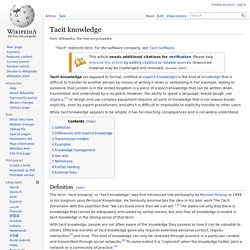
For example, stating to someone that London is in the United Kingdom is a piece of explicit knowledge that can be written down, transmitted, and understood by a recipient. However, the ability to speak a language, knead dough, use algebra,[1] or design and use complex equipment requires all sorts of knowledge that is not always known explicitly, even by expert practitioners, and which is difficult or impossible to explicitly transfer to other users. While tacit knowledge appears to be simple, it has far-reaching consequences and is not widely understood. Definition[edit] Spiritual Succor.
Transcendence. Higher consciousness. Higher consciousness is the consciousness of a higher Self, transcendental reality, or God.
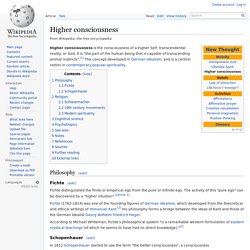
It is "the part of the human being that is capable of transcending animal instincts". The concept developed in German Idealism, and is a central notion in contemporary popular spirituality. Philosophy[edit] Fichte[edit] Analytic–synthetic distinction. Esoteric Endeavors. Philosophikos. Consiousness.pdf. Scientists offer quantum theory of soul's existence. Maybe Patrick Swayze was onto something when he walked off to heaven at the end of 'Ghost'.
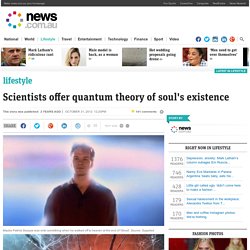
Source: Supplied According to the quantum consciousness theory, the soul lives within structures called microtubules that live inside brain cells. Source: Supplied A PAIR of world-renowned quantum scientists say they can prove the existence of the soul. American Dr Stuart Hameroff and British physicist Sir Roger Penrose developed a quantum theory of consciousness asserting that our souls are contained inside structures called microtubules which live within our brain cells. Their idea stems from the notion of the brain as a biological computer, "with 100 billion neurons and their axonal firings and synaptic connections acting as information networks". The Great Consciousness Swindle: Why Philosophers Will Never Find Consciousness, And Why They Secretly Don’t Want To. As someone who writes regularly on aspects of the brain and consciousness, I have recently received a large amount of correspondence from people wondering what I think about a news article linking consciousness to quantum gravity in cellular microtubules, and how this model could offer “proof” of the soul’s ability to survive outside the body through some kind of nonlocal quantum hocus-pocus.[1] Even though this theory is presented purely as an exercise in theoretical mathematics, because it was suggested by Roger Penrose, a lauded and respected mathematician and philosopher, many people have jumped to the conclusion that this theory is not only correct, but that it somehow “proves” that consciousness is eternal, immutable, and can travel in and out of the body like a soul.
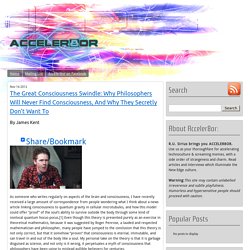
Dhushara. Contents Biocosmology and Consciousness Research.
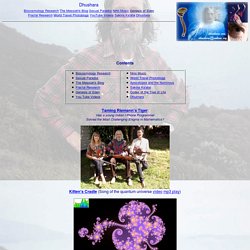
Chaotic Ripple. Public Speaking :: Innovation Design :: Integrative Research k I am a social visionary, innovation strategist and interdisciplinary scholar who weaves together brilliant people and ideas to create integrated solutions t0 the world’s most pressing challenges.
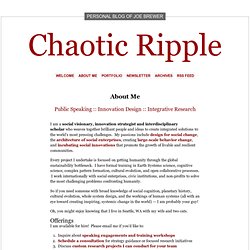
My passions include design for social change, the architecture of social enterprises, creating large-scale behavior change, and incubating social innovations that promote the growth of livable and resilient communities. Every project I undertake is focused on getting humanity through the global sustainability bottleneck. I have formal training in Earth Systems science, cognitive science, complex pattern formation, cultural evolution, and open collaborative processes. Mind Into Matter. BRAIN TIME. [DAVID M.

EAGLEMAN:] At some point, the Mongol military leader Kublai Khan (1215–94) realized that his empire had grown so vast that he would never be able to see what it contained. To remedy this, he commissioned emissaries to travel to the empire's distant reaches and convey back news of what he owned. The Law of Accelerating Returns.
An analysis of the history of technology shows that technological change is exponential, contrary to the common-sense “intuitive linear” view.

So we won’t experience 100 years of progress in the 21st century — it will be more like 20,000 years of progress (at today’s rate). The “returns,” such as chip speed and cost-effectiveness, also increase exponentially. There’s even exponential growth in the rate of exponential growth. Knowledge Is a Common Good - Transform Network. The Effects of the Open Source Movement on the Development of Politics and Society Introduction In October 2009, Transform! Knowledge Management as Educational Science. Knowledge Management as Educational Science Our brains naturally function systematically, and if we can learn to teach and learn to this biological strength we can become far more effective. Image provided by Walter Smith. Can we create a science of knowledge management that teachers can use to influence learning?
In the previous seven articles, I have outlined a system of knowledge management that can be used to design, manage and implement a comprehensive model of education. Do knowledge management systems have a basis in science? Topic: Knowledge Organization and Classification. Documents relating to Knowledge Organization and Classification on Laetus site.
Knowledge Organization. Online access ISKO members have right to access the online version after registering at Ergon website. Status and scope Knowledge Organization (ISSN 0943-7444) is the official bi-monthly journal of ISKO. It was founded in 1973 by Dr. Ko411toc. KO_35_2-3_ToC_Preface.pdf. The Accidental Series from Information Today. The Skeptic's Dictionary. Skeptic's Annotated Bible / Quran / Book of Mormon. Skepsis. The Debunker's Domain, by Robert Sheaffer. Skeptical resources on UFOs, the "paranormal," feminist "scholarship" The Skeptics Society & Skeptic magazine.
Systematic Use of Expert Opinions. An explanation of the experimental Delphi technique, a systematic procedure for obtaining the opinions of experts on a particular subject. Four sets of questionnaires are used, each asking for successive refinements in the estimated answer to a given question. Improving the Reliability of Estimates Obtained from a Consensus of Experts. Convergence of Expert Consensus Through Feedback. New RAND Research System Gathers, Analyzes Expert Opinions. TuesdayJune 14, 2011.